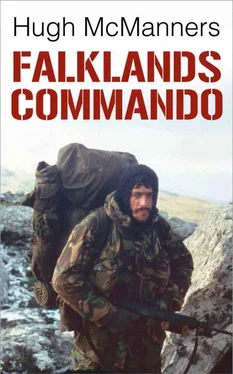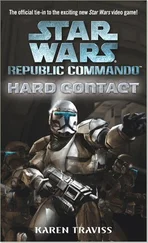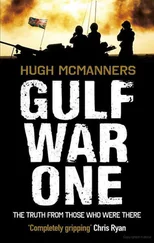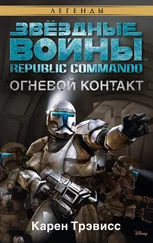Hugh McManners - Falklands Commando
Здесь есть возможность читать онлайн «Hugh McManners - Falklands Commando» весь текст электронной книги совершенно бесплатно (целиком полную версию без сокращений). В некоторых случаях можно слушать аудио, скачать через торрент в формате fb2 и присутствует краткое содержание. Город: London, Год выпуска: 2014, ISBN: 2014, Издательство: Nightstrike Publishing, Жанр: nonf_military, Биографии и Мемуары, на английском языке. Описание произведения, (предисловие) а так же отзывы посетителей доступны на портале библиотеки ЛибКат.
- Название:Falklands Commando
- Автор:
- Издательство:Nightstrike Publishing
- Жанр:
- Год:2014
- Город:London
- ISBN:978-0-992-81540-0
- Рейтинг книги:4 / 5. Голосов: 1
-
Избранное:Добавить в избранное
- Отзывы:
-
Ваша оценка:
- 80
- 1
- 2
- 3
- 4
- 5
Falklands Commando: краткое содержание, описание и аннотация
Предлагаем к чтению аннотацию, описание, краткое содержание или предисловие (зависит от того, что написал сам автор книги «Falklands Commando»). Если вы не нашли необходимую информацию о книге — напишите в комментариях, мы постараемся отыскать её.
Falklands Commando — читать онлайн бесплатно полную книгу (весь текст) целиком
Ниже представлен текст книги, разбитый по страницам. Система сохранения места последней прочитанной страницы, позволяет с удобством читать онлайн бесплатно книгу «Falklands Commando», без необходимости каждый раз заново искать на чём Вы остановились. Поставьте закладку, и сможете в любой момент перейти на страницу, на которой закончили чтение.
Интервал:
Закладка:
After a few hours’ drinking coffee and chatting, the very cross Second-in-Command of 29 Commando Regiment and the other ‘squatters’ plus luggage were moved out to some other less desirable location, with much understandable gnashing of teeth and complaining at our presumption.
We found ourselves in ridiculous luxury. Disbelieving our good fortune, we kept a low profile and our fingers firmly crossed, lest we too might be evicted.
The first thing I’d been looking forward to doing once I got safely on board, was to go for a run. We’d all become very unfit, having taken no proper exercise for over a month. The interminable sitting about in wet ditches, smoking the odd cigar to calm the nerves, the occasional bursts of activity and long tiring moves at night laden with ludicrously heavy packs had been wearying and exhausting. The unhealthy diet of constant compo rations – not enough when out in the field, then too much back on ship, fattening up while we could – had further weakened us. We were all mildly ill: digestive systems not functioning properly, with sore feet, backs and knees – and very run down.
I dug into my para bag and found my running gear. Shivering in shorts, I went up to the cold air of Canberra’s quarter-mile-long promenade deck. She was moored off Port William, and I could see Port Stanley and Beagle Ridge very clearly. There were others doing the same thing, and I started slowly and carefully.
As I trotted round, slowing past the flagpole at the bow and running carefully over the rough bit on the port side where the deck surface had already been destroyed by countless pair of boots during the voyage south, I came across other members of our little unit trotting round as well. At the stern you go through a door into a covered way and around the entrance to the crew’s quarters, who by now were very wary about stepping out into the path of the thundering feet. By convention everyone went round the same way, and to avoid disaster, the direction was announced daily, and was altered for variation. As it got dark the deck lights came on, more people came out to run and the pounding of feet became the dominant sound. The process of getting fit again was not enjoyable, but was something positive that we could do.
Apart from running and sleeping, our main post-operational activity was eating in the palatial first-class dining room. The normal luxury-cruise waiters remained in attendance, every day at every meal, each with a group of several tables to manage. They were excellent. As far as they were concerned, you could eat the entire menu with every alternative, plus seconds if you so desired.
We established ourselves at the same table, and discovered we had a particularly wonderful chap as our waiter. I wish I could remember his name. He’d been aboard for the whole of the crisis, coping as his luxury cruise ship became in turn, an ad hoc Aldershot military training area, the prime target of the Argentine air force, a forwarding station for sunken sailors en route home to Blighty, and a prison transport for Argie prisoners.
Quite understandably, he found the whole desperate experience a bit difficult to take, and so kept himself going with a nip or several throughout the day. As a result, his memory for food orders was unreliable, especially by the evening. So to keep his diners happy and avoid embarrassment – and with our support – he brought one of everything for everybody, and if you couldn’t manage it, you left it. As far as we could observe, his sense of balance with plates was unaffected – unless he was responsible for the loud crashes heard occasionally from the kitchens. We were also able to work our way through the rather splendid P&O wine list (at modest expense), which was most educational.
We did try quite hard to make best use of the excellent cocktail bar – because it was there and we felt we should. But regrettably, to the chagrin of the bar tenders who were keen to show off their drink-building skills, we were not actually up to it. In the evenings, after a couple of pints, then wine with dinner, I would quietly fade away to the tranquillity of Canterbury Court. My digestive system was distinctly unhappy, so I was laid low, on and off for much of the voyage.
I slipped into a routine of either staying in bed until after lunch then getting up and running – or of getting up for an organised 148 Battery exercise-period, which was available by mutual consent every morning for an hour, going back to bed and re-emerging at teatime for another run, then getting stuck into dinner. Some days I couldn’t eat anything at all, and survived on kaolin and morph. I rued the days on Beagle Ridge when, ignoring Nick Allin’s disapproval, I hadn’t used water-sterilisation tablets.
Over the next few days, other units came aboard and settled in. With a few exceptions they were the bulk of 3 Commando Brigade, most of whom we knew very well. It was a time for reunions, not only with people I hadn’t seen since the beginning of Operation Corporate, but with people I hadn’t seen for years. There were the inevitable scenes of heartiness on some evenings – often led by the 3 Commado Brigade Air Squadron pilots – drinking around the grand piano, which was very badly played and drowned out by even worse singing. I did not always feel sufficiently enthusiastic for this – it seemed like an Air Force mess in a war film.
But, along with the drinking, there was also a good deal of serious talk – almost constant comparing of experiences and analysis, throughout the voyage back to England. One evening, in the Crow’s Nest Bar, we were going through one of these alcohol-fuelled debriefing sessions. Willie McCracken was very loudly decrying the decision on the first night of the main attacks, that artillery fire was withheld in order to surprise the enemy.
But far from enabling the commandos to close safely with the enemy, these ‘silent’ night attacks left the Argentinians defences intact and able to fight. The British units had then to withdraw, which is a dangerous process at night, to allow artillery fire to be brought down. But the lesson had been learned. All the subsequent attacks went in preceded by full ‘noisy’ artillery fire preparation.
Willie was complaining about this, and failing to notice that everyone else had suddenly gone silent, loudly declared that the ‘silent attack’ policy had been “a completely criminal decision…. Completely criminal!”
Into this uneasy silence, a single voice piped up:
“Actually Willie, that was my decision…”
Brigadier Julian Thompson had walked up the stairs on the other side of the bar, instigating the sudden silence:
“And,” he added. “I have to say that you are absolutely right.”
Nobody was quite sure how to react – except Willie:
“Ah Brigadier,” he replied. “I’m glad you’re here. There’s a couple of another things I’d like to discuss with you….”
At this everyone roared with laughter, and Willie bought Brigadier Julian a drink – although it could easily have been the other way round.
The afternoon before we sailed, Major Brian Armitage, with a bad back injury from his serious encounter with an Argie landmine, was flown on board and incarcerated in the sickbay. He looked well enough but was in pain. He couldn’t laugh without discomfort and was trying hard not to appear worried about how good a recovery he would make. Brian faced weeks of complete immobility in bed, followed by six weeks in a cylinder of plaster to allow the bones to grow back together. We understood he was concerned about whether all his natural functions might be impaired, so a couple of copies of Mayfair magazine were rushed to the Sickbay. The Regiment was gratified when Brian let it be known that he was now one worry less. Canberra’s own sickbay staff, aided by RAMC and RN medical staff, provided lively and kindly care for the dozen or so wounded who came back with us. We tried to get down to the sickbay every day at different times to see Brian. There always seemed to be a good crowd around his bed and I was more entertained by him I thought, than he by me.
Читать дальшеИнтервал:
Закладка:
Похожие книги на «Falklands Commando»
Представляем Вашему вниманию похожие книги на «Falklands Commando» списком для выбора. Мы отобрали схожую по названию и смыслу литературу в надежде предоставить читателям больше вариантов отыскать новые, интересные, ещё непрочитанные произведения.
Обсуждение, отзывы о книге «Falklands Commando» и просто собственные мнения читателей. Оставьте ваши комментарии, напишите, что Вы думаете о произведении, его смысле или главных героях. Укажите что конкретно понравилось, а что нет, и почему Вы так считаете.












